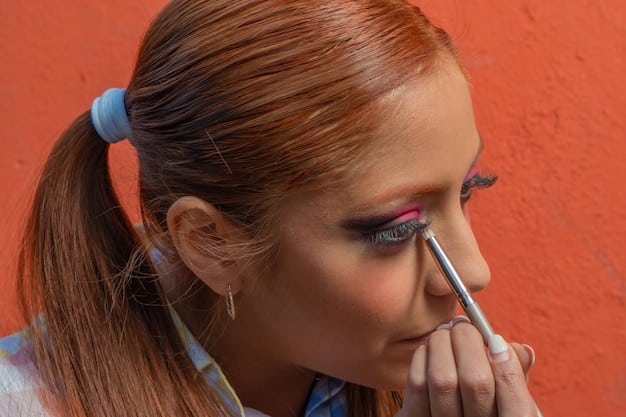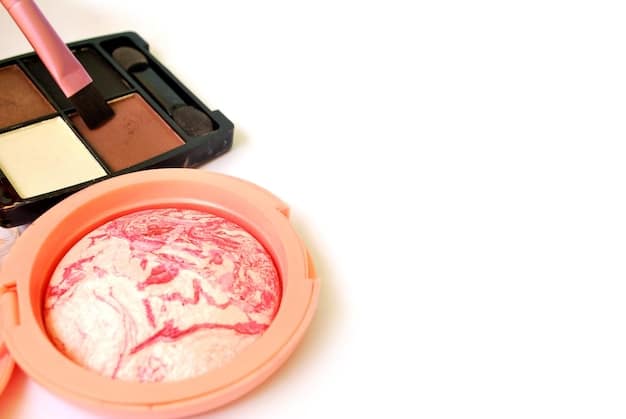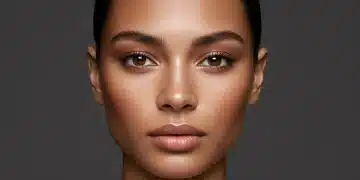Monochromatic Makeup: Achieve Effortless Chic with This Guide

Achieving a monochromatic makeup look involves using different shades of the same color to create a cohesive and effortlessly chic appearance, simplifying your routine while maximizing impact.
Ever wondered how to create a makeup look that’s both simple and stunning? A monochromatic makeup look is the answer. It’s all about using different shades of the same color family to create a harmonious and effortlessly chic appearance.
Understanding the Monochromatic Makeup Trend
Monochromatic makeup isn’t just a trend; it’s a timeless technique that simplifies your routine while maximizing impact. Celebrities and makeup artists alike have embraced this style for its versatility and chic appeal.
What Exactly is Monochromatic Makeup?
Monochromatic makeup involves using various shades, tones, and textures of a single color across your eyes, cheeks, and lips. The goal is to create a seamless, unified look that enhances your natural features.
Why is it so Popular?
Its popularity stems from its simplicity and the polished appearance it creates. Monochromatic looks are easy to achieve, making them perfect for both makeup novices and seasoned pros.
- Simplicity: Requires fewer products and less color matching.
- Versatility: Suitable for any skin tone and occasion.
- Chic Appearance: Creates a refined and cohesive look.
Consider the elegance of a rose-toned face, where soft pink eyeshadow blends seamlessly into a blush on your cheeks, culminating in a muted rose lip. This harmony is what makes monochromatic makeup so appealing.
Choosing Your Monochromatic Color Palette
Selecting the right color palette is crucial for achieving a flattering monochromatic makeup look. Consider your skin tone, undertones, and personal preferences when making your choice. Understanding these factors can significantly enhance the final result.

Skin Tone Considerations
Different skin tones complement different colors. Fair skin tones often look great with soft pinks and peaches, while medium skin tones can pull off warmer shades like coral and bronze. Darker skin tones shine with rich berries and deep browns.
Understanding Undertones
Undertones play a vital role in how a color appears on your skin. If you have warm undertones (yellow or golden), opt for warm-toned colors like golden browns or warm peaches. Cool undertones (pink or blue) pair well with cool-toned colors like mauve or berry shades. Neutral undertones can experiment with a wide range of colors.
- Warm Undertones: Golden browns, warm peaches, corals.
- Cool Undertones: Mauves, berry shades, cool pinks.
- Neutral Undertones: Versatile, can wear most colors.
For instance, someone with warm, olive skin might choose a bronze or terracotta palette to enhance their natural warmth, creating a sun-kissed glow.
Step-by-Step Guide to Creating a Monochromatic Makeup Look
Now, let’s dive into a step-by-step guide to help you create a stunning monochromatic makeup look. This process includes prepping your skin, applying the base, and layering shades seamlessly.
Step 1: Prep Your Skin
Start with a clean, moisturized face. Proper skincare ensures a smooth canvas for your makeup. Apply a primer to help your makeup last longer and create an even surface.
Step 2: Apply Your Base
Use a foundation or BB cream that matches your skin tone. Conceal any blemishes or dark circles. Setting your base with a translucent powder will help it stay in place.
Step 3: Eyeshadow Application
Choose an eyeshadow palette in your chosen monochromatic color family. Apply a lighter shade all over your eyelid as a base. Use a medium shade in the crease to add depth. Blend well to avoid harsh lines.
- Base Shade: Lightest shade, applied all over the lid.
- Crease Shade: Medium shade, blended into the crease.
- Highlight: A shimmer shade on brow bone and inner corner.
Step 4: Blush Application
Select a blush in the same color family as your eyeshadow. Apply it to the apples of your cheeks, blending towards your temples. Use a light hand to build up the color gradually.
Step 5: Lip Color
Pick a lipstick or lip gloss that complements the rest of your makeup. For a subtle look, opt for a tinted balm or sheer lipstick. For a bolder look, choose a more pigmented lipstick in a matching shade.
Remember, blending is key to achieving a seamless and natural monochromatic look. Take your time and use soft, fluffy brushes to blend the colors together.
Monochromatic Makeup Looks for Different Occasions
Monochromatic makeup is incredibly versatile and can be adapted for various occasions, from casual daytime outings to glamorous evening events. By adjusting the intensity and finish of your chosen colors, you can create a look that’s perfect for any setting.
Daytime Casual
For a daytime look, opt for soft, natural shades. Peach or light pink tones can create a fresh and radiant appearance. Use a tinted moisturizer instead of heavy foundation for a more relaxed vibe.
Office Appropriate
Neutral shades like taupe or light brown are ideal for the office. These colors are subtle yet polished. A matte finish is generally more professional than shimmer or glitter.

Evening Glam
For a night out, amp up the intensity with deeper, more vibrant shades. Berry tones, deep browns, or even a bold red can create a dramatic and captivating look. Add shimmer or glitter for extra glam.
- Daytime: Soft peach or light pink tones, tinted moisturizer.
- Office: Neutral taupe or light brown shades, matte finish.
- Evening: Deep berry tones or bold reds, shimmer or glitter.
Experiment with different textures, like cream blushes or metallic eyeshadows, to add interest to your monochromatic look. A touch of highlighter can also enhance your features.
Tips and Tricks for a Flawless Monochromatic Finish
Achieving a flawless monochromatic finish requires attention to detail and a few key techniques. Here are some tips and tricks to help you create a polished and professional look.
Blending is Key
Seamless blending is essential for a natural monochromatic look. Use soft, fluffy brushes to blend the edges of your eyeshadow, blush, and lip color. Avoid harsh lines by continually blending.
Use Different Textures
Mix different textures to add dimension to your look. For example, pair a cream blush with a powder eyeshadow or a matte lipstick with a shimmer highlighter.
Start Light and Build Up
It’s always easier to add more color than to take it away. Start with a light application and build up the intensity gradually. This will prevent you from applying too much product at once.
- Blending: Use soft, fluffy brushes and blend continuously.
- Textures: Mix cream and powder formulas for dimension.
- Build-Up: Start light and add more color gradually.
Don’t Forget the Details
Pay attention to small details like groomed eyebrows, curled lashes, and a touch of mascara. These finishing touches can make a big difference in your overall look.
With practice and patience, you can master the art of monochromatic makeup and create stunning looks that enhance your natural beauty.
Common Mistakes to Avoid in Monochromatic Makeup
While monochromatic makeup is relatively simple, there are some common mistakes that can hinder your results. By being aware of these pitfalls, you can avoid them and achieve a more polished outcome.
Using the Exact Same Shade
One of the biggest mistakes is using the exact same shade for your eyes, cheeks, and lips. This can result in a flat, one-dimensional look. Instead, opt for different shades and textures within the same color family to create depth and dimension.
Ignoring Undertones
Ignoring your skin’s undertones can lead to a mismatch between your makeup and your complexion. Choose colors that complement your undertones to enhance your natural beauty. Warm undertones pair well with warm colors, while cool undertones look great with cool colors.
Overdoing It on the Eyes
Applying too much eyeshadow or using a shade that’s too dark can overwhelm your eyes. Keep the eyeshadow application balanced and blend well to avoid harsh lines.
- Same Shade: Avoid using the exact same shade; vary textures.
- Undertones: Choose colors that complement your skin’s undertones.
- Eyeshadow: Avoid over-application and harsh lines.
Not Blending Properly
Poor blending can result in a patchy, uneven finish. Take the time to blend your makeup seamlessly for a natural and polished look.
| Key Aspect | Brief Description |
|---|---|
| 🎨 Color Choice | Select a single color family, such as pink or brown. |
| ✨ Blending | Seamlessly blend shades across eyes, cheeks, and lips. |
| ✔️ Skin Prep | Start with a clean, moisturized face for smooth application. |
| 💄 Lip Color | Choose a lip shade that complements the eyeshadow and blush. |
Frequently Asked Questions About Monochromatic Makeup
▼
The primary advantage of monochromatic makeup is its simplicity. It requires fewer products and eliminates the guesswork of color matching, making it an excellent choice for quick, polished looks.
▼
Consider your skin’s undertones. Warm undertones pair well with warm colors like peach or bronze, while cool undertones look great with cool colors like mauve or berry shades.
▼
Yes, some products are multi-purpose. Cream blushes, for instance, can often be used on the cheeks and lips. Just ensure the formula is safe for use in all areas.
▼
Use soft, fluffy brushes and blend in circular motions. Focus on blending the edges to avoid harsh lines. A seamless blend is key to a natural, cohesive look.
▼
Yes, monochromatic makeup is versatile and suitable for all ages. The key is to choose age-appropriate shades and adjust the intensity to complement your features.
Conclusion
Mastering the monochromatic makeup look offers a simple yet sophisticated way to enhance your natural beauty. By understanding your skin tone, choosing the right color palette, and perfecting your blending technique, you can achieve a polished and cohesive appearance for any occasion.





